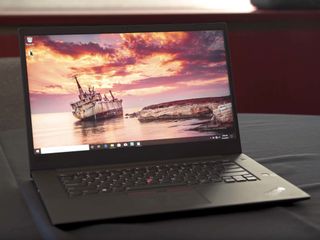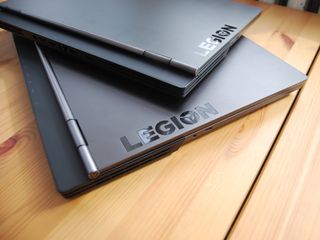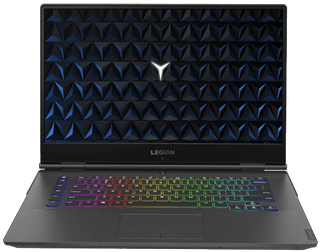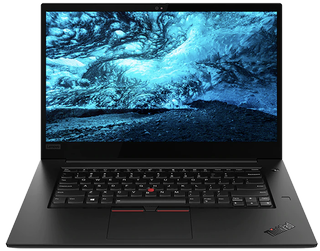
Is Lenovo's ThinkPad X1 Extreme good for gaming?
What's so great about the Lenovo Legion Y740 15?

Lenovo's Legion lineup of laptops is all about gaming performance and design. The Y740 15, which we reviewed quite favorably, is available with up to a 9th Gen Intel Core i7-9750H processor (CPU), 32GB of DDR4-2666MHz RAM, a 1TB M.2 PCIe solid-state drive (SSD) coupled with a 1TB SATA hard-disk drive (HDD), and a NVIDIA RTX 2080 Max-Q graphics card (GPU) with 8GB of VRAM. With top specs, the Legion Y740 is a beast, and it will easily outperform the X1 Extreme.
There's no 4K display option for the Y740, but you can choose between two 15.6-inch FHD models. The first and cheaper version has an IPS panel, 144Hz refresh rate, and 300 nits brightness. To pair well with the NVIDIA GPU, it's compatible with G-Sync, which offers smoother visuals. The other, more expensive display option has the same FHD resolution, same 144Hz refresh rate, and is G-Sync enabled, but it's capable of hitting 500 nits brightness and includes Dolby Vision HDR400.
The keyboard has customizable RGB backlighting, a column of macro keys along the left side that you can use for in-game shortcuts, and the generous collection of ports is mostly located along the back of the laptop for easier cable management. While the battery certainly won't last as long as the one in the X1 Extreme, the Y740 remains cool and quiet under load and, in our testing, there was no sign of thermal throttling.
As for price, a baseline Legion Y740 with 9th Gen Intel Core i7-9750H CPU, 8GB of RAM, a 1TB HDD coupled with a 256GB PCIe SSD, and a NVIDIA GTX 1660 Ti GPU costs less than the introductory X1 Extreme model with Core i5 CPU and NVIDIA GTX 1650 GPU. As you scale up in hardware, you're generally going to get more performance for less money with the Y740.

You're going to have a great time
Up to an RTX 2080 GPU and hexa-core Intel Core i7-9750H CPU don't keep this laptop from running cool. It's all wrapped up in an aluminum chassis that's styled for gamers, and it will generally cost less than the X1 Extreme, at least until you scale way up in hardware.
What is the ThinkPad X1 Extreme capable of?
The ThinkPad X1 Extreme is more geared toward a life in the professional world, and as far as business laptops go, it's nothing to balk at. It can be configured with similar 9th Gen Intel Core CPUs, it's available with up to 64GB of DDR4-2666MHz RAM, and it has room for up to a 1TB PCIe SSD. It also has a considerably larger battery than the Y740 (80Wh compared to 57Wh), so if being able to leave your AC adapter behind is important, the X1 Extreme is going to fare much better.
There is only one NVIDIA GTX 1650 GPU option available with the X1 Extreme. It's outpaced even by the NVIDIA GTX 1660 Ti available in the Y740 baseline model, but it's still capable of handling most modern games at 1080p. You won't be able to crank up the graphics settings, but it will do the trick if you like to enjoy some gaming once in a while in your downtime. Just don't opt for the 4K display option in the X1 Extreme and expect a smooth gaming experience from the GPU at the higher resolution.
The overall design of the X1 Extreme brings a lighter and thinner chassis that's better geared toward putting up with abuse, and you should find it's much easier to travel with. If extra security measures are important to you, all models come with a fingerprint reader, and models with HDR400 display also come complete with an IR camera for facial recognition through Windows Hello.
Get the Windows Central Newsletter
All the latest news, reviews, and guides for Windows and Xbox diehards.
The X1 Extreme is more versatile and will fit in far better in a boardroom or in the field. If gaming is your first priority, go with the Legion Y740 15.

Much better suited for work life
The ThinkPad X1 Extreme's overall design and hardware choices make it a well-rounded Ultrabook. It's durable, it's relatively powerful, and it's portable thanks to long battery life and lightweight chassis.

Cale Hunt brings to Windows Central more than eight years of experience writing about laptops, PCs, accessories, games, and beyond. If it runs Windows or in some way complements the hardware, there’s a good chance he knows about it, has written about it, or is already busy testing it.
